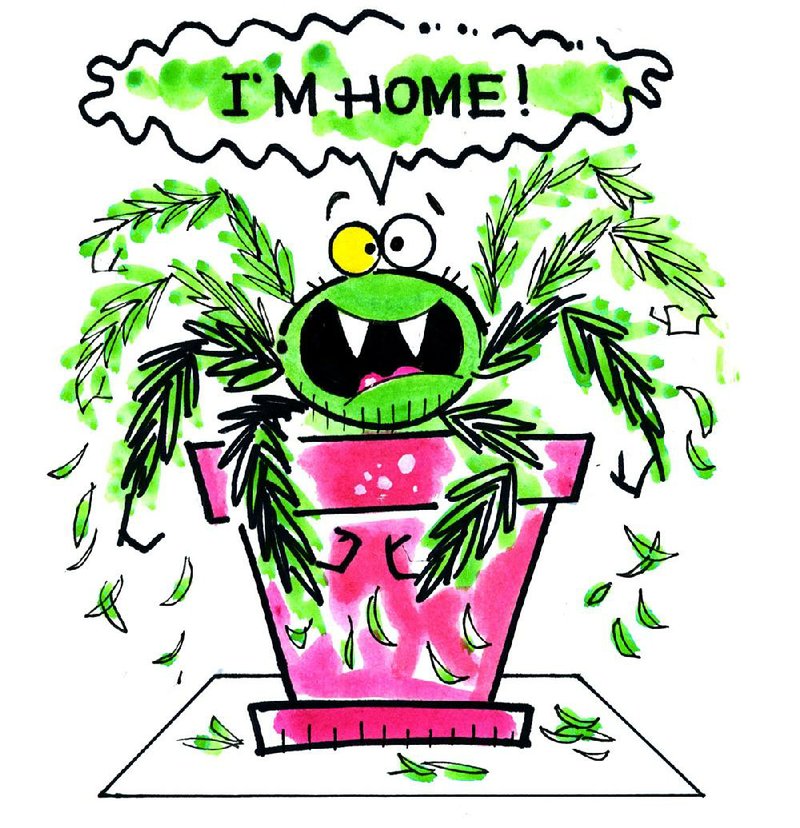Q How can I be sure there are no spiders on the plants that have been outside this summer when I bring them in for the winter?
A Rinse them off well or put them in your shower stall and turn the water on and wash them off. Then monitor. I will say that since you have waited so late in the season to move the plants in, they will probably have a bit of transplant shock. Even though we have not had a killing frost, we have had some nippy nights. Moving them in when the inside and outside temperatures are similar makes for an easier transition.
Q I am relatively new at trying to grow plants and trees. I have a pear tree that is young, about 3 years old now, and it's still quite spindly. It produced quite a few pears this year, but the trunk of the tree is very slender. Should I fertilize this tree and, if so, when? I also have some plum trees that I think need fertilizing. They are older, about 10 years, and still produce, but some of the limbs have died. Should I fertilize them and, if so, when?
A Most fruit trees benefit from an application of fertilizer once or twice a year depending on their age. For young trees, in early spring broadcast a complete fertilizer (10-10-10). You can repeat this again in June. For older trees, broadcast fertilizer around the tree every year in late March. Usually, well-established trees need only one application of fertilizer a year, but watering is important for all fruit trees.
Q I have cleared brush -- honeysuckle vines, briers, little trees, etc. Today, I am beginning to plant 1,200 bulbs in this area. I am wondering, after the bulbs are all planted, is there some kind of pre-emerge that I can apply so the vines and briers will not come back with a vengeance?
A Unfortunately, most of the weeds you are describing are perennials or woody plants, which a pre-emergent has no effect on. Pre-emergent herbicides work only on annual weeds -- those that germinate, grow and die in one season. The herbicide prevents the weed seeds from germinating. It will not prevent these perennials from resprouting from the roots. So just be vigilant, mulch and keep it as clean as you can. Once the bulbs have had at least six weeks' growing time following bloom, the bulb foliage can be mowed down and with it the weeds, too.
Q What should we do with the nursery mums used in our fall decorations, throw them away or plant them?
A Although the mums are perennial, most people treat them as annuals and toss them after bloom. If you do plant them, be aware that you need to prune them through the next growing season to keep them full and bushy before they bloom next fall. I think they take up too much space in the garden until they bloom in the fall. The plants you can buy at local nurseries are so full and beautiful each year that I buy new ones every year.
Q I still have lots of tomatoes this time of year and a lot of them split at the top. Got any idea why?
A I am still harvesting tomatoes too, even though the plants look a bit bedraggled. The splitting is caused by uneven moisture. When they get dry and then you water or we finally get a heavy rain, the fruits tend to split. Some varieties are more susceptible to this than others, but I even had a few splits just recently on some cherry tomatoes. For reference next year, mulching does help.
Q I made several cuttings from my gardenia in the spring. They were all doing fine, set in pots. Yesterday I showed them to some relatives visiting, and all were intact. Today I went out to water, and one is cut off at ground level; two others are cut off several inches above ground. I first thought someone had actually cut them, but then I noticed that on one, below the cut, it looked like something had been chewing on it. Any ideas what is going on?
A Sounds like a squirrel or other creature has had a nibble. I would suggest you move the cuttings inside now for the winter. Put them in a sunny window in a cool spot in your house and let them regrow. They are too fragile to be planted outside this late in the year. Wait for spring, after all chances of frost have passed, and plant in either a larger container outside or in the ground.
DEAR READERS: I am giving a workshop at Garvan Woodland Gardens. "An All Arkansas Holiday" will be 1-4:30 p.m. Nov. 22 in the Magnolia Room. I will be there with the garden staff, former National Park College culinary instructor Karla Nardi, Superior Bathhouse and Brewery Chef Angela Nardi and Audrey House of Chateau Aux Arc Vineyards and Winery. Learn to decorate for the holidays using materials from your own garden and how to entertain using locally grown Arkansas foods. Workshop participants will have free admission to the opening of Holiday Lights at 5 p.m.
The cost is $90 ($75 for members), and registration is required.
To reserve a place, call (800) 366-4664 or click through the event calendar at garvangardens.org.
Janet B. Carson is a horticulture specialist for the University of Arkansas Cooperative Extension Service. Write to her at 2301 S. University Ave., Little Rock, Ark. 72204 or email her at
jcarson@arkansasonline.com
HomeStyle on 11/07/2015
